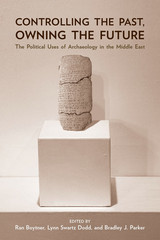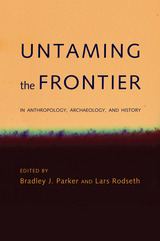2 books by Parker, Bradley J.

Controlling the Past, Owning the Future
The Political Uses of Archaeology in the Middle East
Edited by Ran Boytner, Lynn Swartz Dodd, and Bradley J. Parker
University of Arizona Press, 2010
What are the political uses—and misuses—of archaeology in the Middle East? In answering this question, the contributors to this volume lend their regional expertise to a variety of case studies, including the Taliban’s destruction of Buddhas in Afghanistan, the commercialization of archaeology in Israel, the training of Egyptian archaeology inspectors, and the debate over Turkish identity sparked by the film Troy, among other provocative subjects. Other chapters question the ethical justifications of archaeology in places that have “alternative engagements with the material past.” In the process, they form various views of the role of the archaeologist, from steward of the historical record to agent of social change.
The diverse contributions to this volume share a common framework in which the political use of the past is viewed as a process of social discourse. According to this model, political appropriations are seen as acts of social communication designed to accrue benefits to particular groups. Thus the contributors pay special attention to competing social visions and the filters these impose on archaeological data. But they are also attentive to the potential consequences of their own work. Indeed, as the editors remind us, “people’s lives may be affected, sometimes dramatically, because of the material remains that surround them.”
Rounding out this important volume are critiques by two top scholars who summarize and synthesize the preceding chapters.
The diverse contributions to this volume share a common framework in which the political use of the past is viewed as a process of social discourse. According to this model, political appropriations are seen as acts of social communication designed to accrue benefits to particular groups. Thus the contributors pay special attention to competing social visions and the filters these impose on archaeological data. But they are also attentive to the potential consequences of their own work. Indeed, as the editors remind us, “people’s lives may be affected, sometimes dramatically, because of the material remains that surround them.”
Rounding out this important volume are critiques by two top scholars who summarize and synthesize the preceding chapters.
[more]

Untaming the Frontier in Anthropology, Archaeology, and History
Edited by Bradley J. Parker and Lars Rodseth
University of Arizona Press, 2005
Despite a half century of attempts by social scientists to compare frontiers around the world, the study of these regions is still closely associated with the nineteenth-century American West and the work of Frederick Jackson Turner. As a result, the very concept of the frontier is bound up in Victorian notions of manifest destiny and rugged individualism. The frontier, it would seem, has been tamed. This book seeks to open a new debate about the processes of frontier history in a variety of cultural contexts, untaming the frontier as an analytic concept, and releasing it in a range of unfamiliar settings. Drawing on examples from over four millennia, it shows that, throughout history, societies have been formed and transformed in relation to their frontiers, and that no one historical case represents the normal or typical frontier pattern. The contributors—historians, anthropologists, and archaeologists—present numerous examples of the frontier as a shifting zone of innovation and recombination through which cultural materials from many sources have been unpredictably channeled and transformed. At the same time, they reveal recurring processes of frontier history that enable world-historical comparison: the emergence of the frontier in relation to a core area; the mutually structuring interactions between frontier and core; and the development of social exchange, merger, or conflict between previously separate populations brought together on the frontier. Any frontier situation has many dimensions, and each of the chapters highlights one or more of these, from the physical and ideological aspects of Egypt’s Nubian frontier to the military and cultural components of Inka outposts in Bolivia to the shifting agrarian, religious, and political boundaries in Bengal. They explore cases in which the centripetal forces at work in frontier zones have resulted in cultural hybridization or “creolization,” and in some instances show how satellite settlements on the frontiers of core polities themselves develop into new core polities. Each of the chapters suggests that frontiers are shaped in critical ways by topography, climate, vegetation, and the availability of water and other strategic resources, and most also consider cases of population shifts within or through a frontier zone. As these studies reveal, transnationalism in today’s world can best be understood as an extension of frontier processes that have developed over thousands of years. This book’s interdisciplinary perspective challenges readers to look beyond their own fields of interest to reconsider the true nature and meaning of frontiers.
[more]
READERS
Browse our collection.
PUBLISHERS
See BiblioVault's publisher services.
STUDENT SERVICES
Files for college accessibility offices.
UChicago Accessibility Resources
home | accessibility | search | about | contact us
BiblioVault ® 2001 - 2024
The University of Chicago Press









